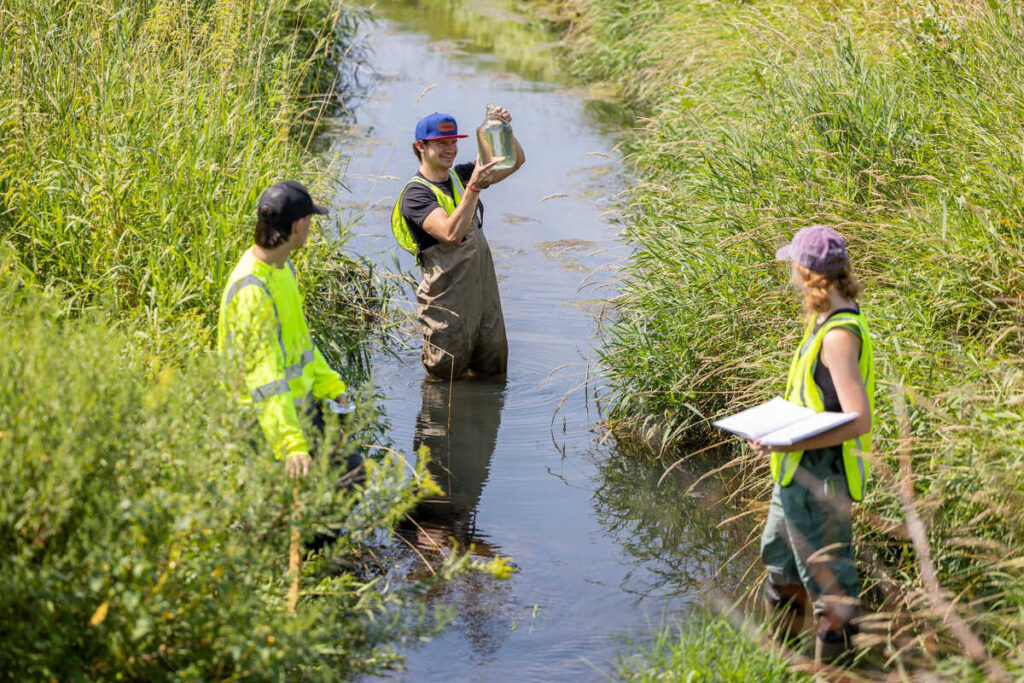As the world recently learned that former President Jimmy Carter is receiving hospice care at his home in Georgia, the Newsroom remembers Feb. 21, 2004, when President Carter and his wife, Rosalynn Carter, visited the St. Paul campus of the University of St. Thomas. Watch the video and read the below article from the spring 2004 issue of St. Thomas magazine to learn more about their visit.
Jimmy and Rosalynn Carter Honor 'Those Who Stretch Their Hearts and Minds'
They must have been tired after serving dinner to more than 840 people that Feb. 21 evening. But many of the waiters gathered enthusiastically inside the main doors of St. Thomas’ Schoenecker Arena and joined in the standing ovation for former President Jimmy Carter and Rosalynn Carter. “He is someone special,” one young woman said.
“When our parents wanted us to grow up to be real human beings, they were talking about people like the Carters,” said Robyne Robinson, Fox 9 News, who emceed the event.
Carter, who was president from 1977 to 1981, was at St. Thomas to honor the Minnesota Campus Compact 10th anniversary and present the Carter Partnership Award. Campus Compact is a nonprofit coalition of 48 college and university presidents, including Father Dennis Dease, St. Thomas president. It is committed to strengthening communities by mobilizing diverse human, financial and material resources. Founded in 1994, the Minnesota coalition has distributed $3 million in grants for nearly 300 projects, and its students annually contribute more than one million hours of service.
The Carter Partnership Award of $10,000 went to the Grant Community School Collaborative of Duluth. In his remarks, Carter, 79, said, “Almost every human being would like to expand their hearts and minds to other people with responsibility, compassion and love. But it is hard to cross that barrier from the ivy halls of a university or a middle-class community.”
Help from a combination of major corporations, universities and other communities can add a new dimension to the life of the poor and to those who volunteer, Carter noted. “A greater understanding benefits those in real need. It also benefits those who are benevolent. They have learned to stretch their hearts and minds.”
Former Sen. Walter Mondale, 75, was Carter's vice president and “the best vice president the nation has ever seen,” Carter said. Mondale, the Democratic nominee for president in 1984 who was defeated by Ronald Reagan, introduced Carter by referring to him as a president who “stands out for his dedication to the community.”
Carter’s presidency was marred by the Soviet invasion of Afghanistan, rising inflation and energy costs, and Iran’s seizure of 52 American Embassy hostages (held for 14 months and released on the day Carter left office).
His achievements included championing human rights, protecting the environment, appointing minorities to government posts, creating the Department of Education, forging the Camp David agreement between Egypt and Israel, creating diplomatic relations with China, and beginning negotiations with the Soviet Union on a nuclear limitation treaty.
Since 1982, the Carters have devoted themselves to community service through the Carter Center in Atlanta. Carter was awarded the Nobel Peace Prize in 2002.
More Tales from the Archives
-
-
Tales from the Archives: Mid-Winter Celebrations
People & Culture -
Tales from the Archives: The Outdoor Nativity Scene
People & Culture -
Tales from the Archives: International Students at St. Thomas
People & Culture






